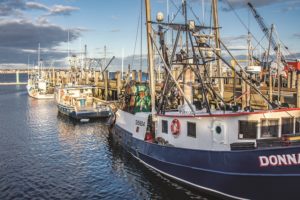PROVINCETOWN — The Public Pier Corp. has decided to raise the dockage rates at MacMillan Pier by 50 percent for commercial vessels over the next two years.
At the second public hearing on new harbor regulations on Feb. 15, the members of the Pier Corp. board responded to a raft of negative comments from fishermen and the owners of charter boats and whale watch vessels, and then approved the new fees. New rates go into effect this year and rise annually through 2023.
“We acknowledge these are difficult times for a lot of people,” said Scott Fraser, a member of the board. “But the natural processes of decay happen whether there is a pandemic or not.”
Fraser said rust and rot do not stop, and that further deferred maintenance will cause a public safety hazard.
“It’s not that we’re raising prices because we want to; it’s because there are really big projects coming,” he added.
The revised harbor regulations increase the dockage fees for large commercial fishing vessels (50 feet long or larger) from $44.47 per foot to $65 per foot this year and to $85 per foot by 2023.
For smaller commercial fishing boats, the rate goes from $61.73 per foot to $95 this year and to $120 by 2023.
For the Dolphin Fleet Whale Watch boats, the new dock fee goes from $10,350 to $15,000. The Pier Corp. members delayed a vote on passenger fee increases applying to ferries and whale watch vessels pending an opinion from town counsel. The board proposes to increase the passenger surcharge from $75 to $95 per seat and the per-person embarkation fee of 75 cents to $2.

The board’s decision to consult town counsel came after the Dolphin Fleet owner’s attorney told them on Feb. 4 that these passenger fees amount to a tonnage tax, which can be levied only by the federal government, not by the town, according to Seth Holbrook of the Boston law firm Holbrook & Murphy.
The Pier Corp. members appeared not to be too worried about this legal challenge, however. In 2015, when the passenger fees were imposed for the first time, Provincetown’s lawyer said the tonnage tax argument was irrelevant. The argument was used successfully to strike down unreasonably high fees charged by a port authority to a passenger vessel, according to Pier Corp. board member Jamie Staniscia.
The Provincetown fees are in no way similar to the port authority case, said Staniscia, who then asked his fellow board members to approve the passenger fees along with everything else. But the others voted to wait. For that reason, Staniscia was the lone dissenter in approving the new harbor regulations.
Fishermen and other pier users circulated a petition asking the Pier Corp. to freeze the new rates because of financial hardship from the pandemic, said Regina Binder, chair of the Pier Corp. board.
Staniscia said the petition included many signatures of people who are not Provincetown citizens.
Fraser addressed complaints about a change in the harbor regulations that gives slip space preference to Provincetown residents. Current users should not worry, he said, because there is a grandfather clause allowing all those who have slips to remain. This new rule applies only to vacant spaces, he said. Only about six of 50 slips are currently occupied by Provincetown residents, Fraser said.
Provincetown taxpayers have paid $2.3 million for pier improvements, Fraser said, so they are entitled to some preferential treatment.



